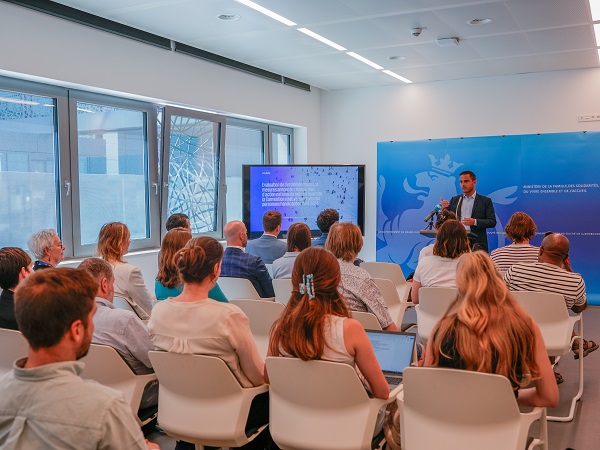 Max Hahn, Luxembourg's Minister for Family Affairs, Solidarity, Living Together and Reception of Refugees;
Credit: MFSVA
Max Hahn, Luxembourg's Minister for Family Affairs, Solidarity, Living Together and Reception of Refugees;
Credit: MFSVA
At a press conference on Tuesday 24 June 2025, Luxembourg's Minister for Family Affairs, Solidarity, Living Together and Reception of Refugees, Max Hahn, together with the external audit firm KPMG, presented the results of the final evaluation of the 2019-2024 national action plan (PAN) for the implementation of the United Nations (UN) Convention on the Rights of Persons with Disabilities (CRPD).
As reported by Luxembourg's Ministry of Family Affairs, Solidarity, Living Together and Reception of Refugees, the action plan has been developed in collaboration with fourteen ministries and constitutes an essential tool for coordinating policies to promote the inclusion and rights of persons with disabilities.
The plan comprises 29 priorities, 55 objectives and 97 concrete actions, structured around eight priority themes:
- Awareness-raising (Article 8 of the CRPD);
- Equal recognition before the law (Article 12);
- Living independently and being included in the community (Article 19);
- Freedom of expression and opinion, and access to information (Article 21);
- Education (Article 24);
- Health (Article 25);
- Work and employment (Article 27);
- Participation in political and public life (Article 29).
Of the 97 planned actions, only five were not initiated, while 36 are ongoing and 56 have been finalised.
"It is essential to ensure that the various measures achieve their objective, namely to make our society more inclusive and strengthen the rights of people with disabilities. In accordance with the principle of 'Nothing about us without us', it is essential to include the people concerned in all stages of the action plan - both in its development and in its evaluation," said Minister Hahn during the report presentation.
The ministry also underlined the importance of external evaluation for ensuring effective political action in this area, by optimising governance related to the plan's implementation and the monitoring of actions.
The final report includes several recommendations, such as developing a more targeted and clearer communication strategy to increase public awareness of the future plan, taking into account the complexity of actions when developing the next plan and strengthening the measurability of actions through more precise indicators.
Since the 2022 mid-term evaluation, several KPMG recommendations have already been implemented, including the creation of two governance bodies: the PAN steering group (GroPil), which brings together ministerial contact points; the PAN monitoring group (GroSuivi PAN), which includes people with disabilities as well as representatives of civil society organisations and human rights bodies.
According to the ministry, these mechanisms helped ensure a structured and inclusive process, in which the people concerned were involved at every stage, starting with the mid-term evaluation.
Preparation for the next national action plan is already underway. By October 2025, the people concerned will be directly involved in shaping future actions. The ministry concluded that the main objective remains unchanged: to build an inclusive society in which everyone can participate with equal rights.








